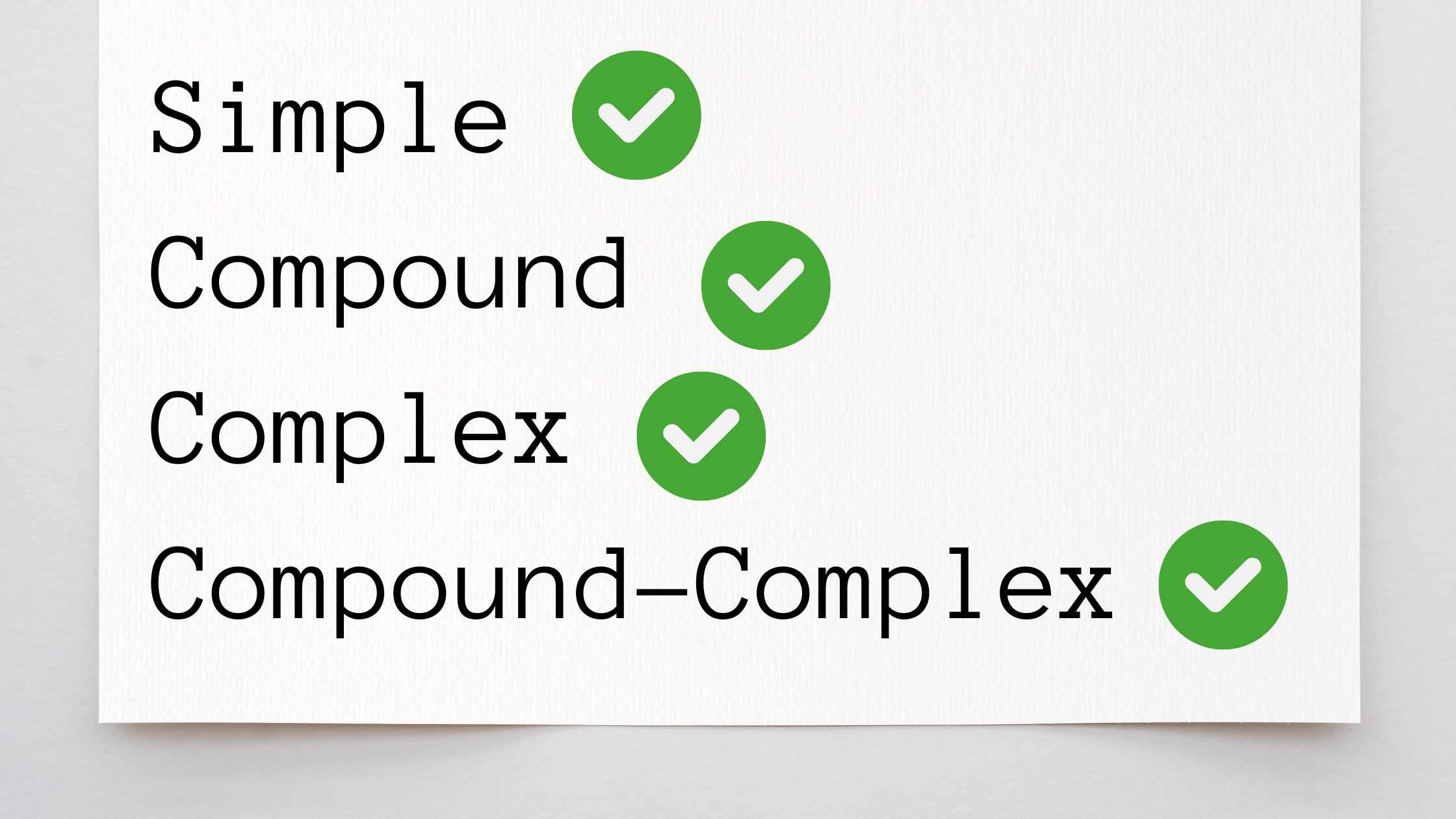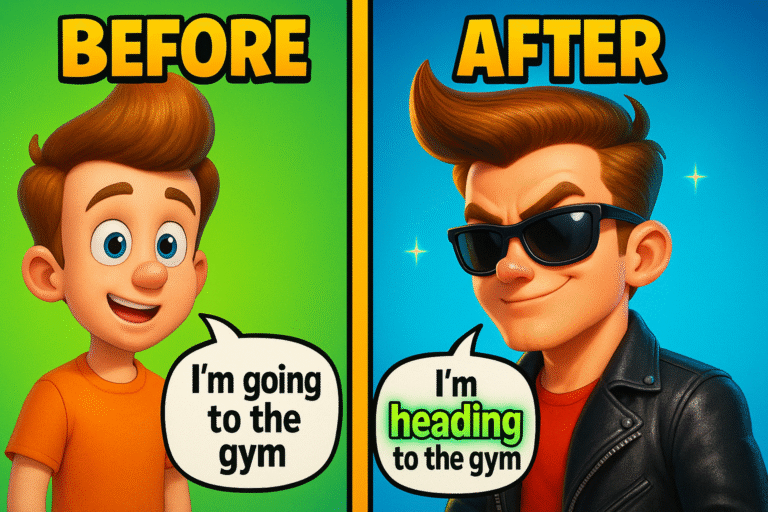Goal
By the end of this lesson, students will be able to:
- Understand and identify simple, compound, complex, and compound-complex sentences.
- Use these sentence types effectively in IELTS Writing Task 2 to express ideas clearly and demonstrate grammatical range.
- Apply sentence types to common IELTS topics (e.g., education, technology, environment, health).
- Simple Sentences:
- Contain one independent clause (subject + verb + complete idea).
- Use for concise, direct statements to introduce ideas or opinions.
- Example: “Education reduces poverty.”
- Compound Sentences:
- Combine two independent clauses with coordinating conjunctions (FANBOYS: for, and, nor, but, or, yet, so).
- Use to compare ideas or show contrast in arguments.
- Example: “Online learning is convenient, but it lacks personal interaction.”
- Complex Sentences:
- Include one independent clause and at least one dependent clause, connected by subordinating conjunctions (e.g., because, although, if, while, since).
- Use to explain reasons, conditions, or concessions in arguments.
- Example: “Although technology improves efficiency, it can create unemployment.”
- Compound-Complex Sentences:
- Combine at least two independent clauses and one or more dependent clauses.
- Use for sophisticated arguments or to combine multiple ideas.
- Example: “While technology saves time, it can be expensive, and many people cannot afford it.”
Why It Matters for IELTS
- Band Descriptor (Grammatical Range and Accuracy): Using a mix of sentence types demonstrates flexibility and sophistication, which is essential for Band 7+.
- Task Response: Different sentence types help structure arguments, explain causes/effects, and provide examples.
- Coherence and Cohesion: Sentence variety improves readability and logical flow.
Quick Tips
- Use simple sentences sparingly for impact.
- Use compound sentences to compare or contrast ideas.
- Use complex sentences to explain “why” or “how.”
- Use compound-complex sentences in body paragraphs for sophistication.
- Avoid Mistakes:
- Overusing simple sentences (looks basic).
- Incorrect conjunctions (e.g., using “and” instead of “but”).
- Missing commas in compound/complex sentences.
Sample Paragraph
Read the paragraph below for the IELTS prompt:
Prompt: “Some people believe that technology has improved education, while others think it has reduced the quality of learning. Discuss both views and give your opinion.”
- Simple: Technology enhances education.
- Compound: Online resources provide access to information, but they can distract students.
- Complex: Although technology offers interactive tools, many students struggle to focus.
- Compound-Complex: While technology makes learning accessible, it can reduce face-to-face interaction, and some students prefer traditional methods.
Self-Check
- Can you identify the independent and dependent clauses in each sentence?
- Notice how each sentence type serves a purpose (e.g., simple for clarity, complex for reasoning).
- Try rewriting one sentence in a different type (e.g., rewrite the complex sentence as a compound sentence).
Example Rewrite:
- Original (Complex): “Although technology offers interactive tools, many students struggle to focus.”
- Rewritten (Compound): “Technology offers interactive tools, but many students struggle to focus.”
Exercise 1: Identify the Sentence Type
Instructions: Read each sentence and decide if it’s simple, compound, complex, or compound-complex. Write your answer, then check using the answer key.
- Many people use public transport to save money.
- Although recycling reduces waste, it requires effort, and some people are unwilling to participate.
- Technology has improved communication, but it can cause misunderstandings.
- If governments invest in renewable energy, pollution will decrease.
- Exercise improves mental health.
Self-Check:
- Simple: One clause (subject + verb + complete idea).
- Compound: Two independent clauses joined by FANBOYS.
- Complex: One independent clause + one dependent clause (starts with subordinating conjunction).
- Compound-Complex: At least two independent clauses + one dependent clause.
Answer Key
- Simple – Many people use public transport to save money.
- Compound-Complex – Although recycling reduces waste, it requires effort, and some people are unwilling to participate.
- Compound – Technology has improved communication, but it can cause misunderstandings.
- Complex – If governments invest in renewable energy, pollution will decrease.
- Simple – Exercise improves mental health.
Tip: If you’re unsure, break the sentence into clauses. Count independent clauses (can stand alone) and dependent clauses (cannot stand alone).
Exercise 2: Transform Sentences
Instructions: Rewrite each simple sentence into compound, complex, and compound-complex sentences. Use the prompts to guide you. Check your answers using the sample answers provided.
- Simple Sentence: Governments should prioritise healthcare.
- Compound: (Use “but” to show contrast.)
- Complex: (Use “because” to explain why.)
- Compound-Complex: (Use “although” and “and” to combine ideas.)
- Simple Sentence: Healthy food improves well-being.
- Compound: (Use “and” to add a related idea.)
- Complex: (Use “if” to show a condition.)
- Compound-Complex: (Use “while” and “so” to combine ideas.)
Your Answers:
- Simple: Governments should prioritise healthcare.
- Compound:
- Complex:
- Compound-Complex:
- Simple: Healthy food improves well-being.
- Compound:
- Complex:
- Compound-Complex:
Sample Answers for Self-Check:
Simple: Governments should prioritise healthcare.
Compound: Governments should prioritise healthcare, but education is also important.
Complex: Because healthcare improves quality of life, governments should prioritise it.
Compound-Complex: Although healthcare is expensive, governments should prioritise it, and citizens will benefit.
Simple: Healthy food improves well-being.
Compound: Healthy food improves well-being, and it reduces medical costs.
Complex: If people eat healthy food, their well-being improves.
Compound-Complex: While healthy food is expensive, it improves well-being, so governments should promote it.
Self-Check Tips:
- For compound, ensure two independent clauses are joined by a FANBOYS conjunction with a comma.
- For complex, check that the dependent clause starts with a subordinating conjunction (e.g., because, if).
- For compound-complex, confirm at least two independent clauses and one dependent clause.
- Read your sentences aloud to check if they sound natural and clear.
Exercise 3: Write a Paragraph
Instructions: Write a 4-5 sentence paragraph for the prompt below. Include one simple, one compound, one complex, and one compound-complex sentence. Label each sentence type. Use the self-check guide to review.
Prompt: “Some people believe that environmental protection is the responsibility of individuals, while others think it is the government’s duty. Discuss both views and give your opinion.”
Your Paragraph:
Self-Check Guide:
- Simple: Does it have one clause? Is it clear and concise?
- Compound: Are there two independent clauses? Is the FANBOYS conjunction correct?
- Complex: Does it have a dependent clause with a subordinating conjunction?
- Compound-Complex: Does it have at least two independent clauses and one dependent clause?
- Compare to this sample:
- Environmental protection is a pressing issue. (Simple)
- Individuals can contribute by recycling and reducing waste, but governments have more resources to enforce policies. (Compound)
- Although individuals play a role in protecting the environment, government action is more effective. (Complex)
- While individuals should adopt sustainable habits, governments must implement strict laws, and this combination can create a cleaner planet. (Compound-Complex)
- In my opinion, both parties share the responsibility. (Simple)
Exercise 4: Error Correction
Instructions: The sentences below have errors in grammar or structure. Rewrite them correctly, ensuring they fit the intended sentence type. Use the answer key to check.
- Incorrect (Compound): Public transport is efficient, it reduces traffic.
- Rewrite: ___________________________
- Incorrect (Complex): Because technology is useful, but it can be distracting.
- Rewrite: ___________________________
- Incorrect (Compound-Complex): Education improves skills it is expensive, many people cannot afford it.
- Rewrite: ___________________________
Answer Key
- Compound: Public transport is efficient, and it reduces traffic.
- Complex: Because technology is useful, it can be distracting.
- Compound-Complex: Although education improves skills, it is expensive, and many people cannot afford it.
Self-Check Tips:
- For compound sentences, ensure a comma before FANBOYS (e.g., “, and”).
- For complex sentences, check that the dependent clause is properly connected (no extra conjunctions like “but”).
- For compound-complex, confirm all clauses are joined correctly with commas where needed.
Task: Write a full IELTS Task 2 essay (250 words) for the prompt:
“Some people believe that children should learn practical skills at school, while others think academic subjects are more important. Discuss both views and give your opinion.”
- Use at least two simple, two compound, two complex, and two compound-complex sentences.
- Underline and label each sentence type (e.g., “(Simple)”).
- Follow the structure: introduction, two body paragraphs, conclusion.
Self-Check Process:
- After writing, count your sentence types to ensure you’ve used at least two of each.
- Check punctuation (e.g., commas before FANBOYS, after dependent clauses).
- Read your essay aloud to ensure clarity and flow.
Answer Key for a balanced view point
Introduction
Education plays a crucial role in preparing children for the future. (Simple) Some argue that practical skills, such as cooking or carpentry, should be prioritised, while others believe academic subjects like mathematics and science are more essential. (Compound) In my opinion, a balanced approach combining both is the best way forward. (Simple)
Main Body Paragraph 1 – Practical Skills
On the one hand, practical skills are essential because they help students handle real-life situations more effectively. (Complex) For instance, students who learn how to manage finances or cook are more likely to become independent adults, and these abilities can benefit them throughout their lives. (Compound-complex) Not all students aim for university, so teaching skills that prepare them for work can improve their employment prospects. (Compound) Although academic subjects are useful, many young people struggle with everyday tasks if they are not taught practical knowledge. (Complex)
Main Body Paragraph 2 – Academic Subjects
Academic subjects, on the other hand, are seen as the foundation of intellectual and career development. (Simple) Subjects like maths and science provide students with the qualifications they need, and this opens doors to higher education and skilled professions. (Compound) It is useful for a lawyer, for example, to have built up years of practice with writing and comprehension to prepare them for building cases. (Complex) If schools provide a single focus on practical life skills, they might be prepared for the real world, but they may struggle if they choose to pursue certain careers. (Compound-complex)
Conclusion
In conclusion, although academic subjects are essential for certain career paths, practical skills are equally important in daily life. (Compound-complex) I believe that the best education systems combine both areas, so students are fully prepared for personal and professional success. (Compound-complex)
Answer Key for a view that prioritises academic subjects
Introduction
Education plays a crucial role in preparing children for the future. (Simple) Some argue that practical skills, such as cooking or carpentry, should be prioritised, while others believe academic subjects like mathematics and science are more essential. (Compound) In my opinion, academic subjects are more important because they provide the foundation for career success and intellectual growth. (Complex)
Main Body Paragraph 1 – Practical Skills + Opinion (Discredit)
Some people think practical skills are essential because they help students handle real-life situations more effectively. (Complex) For example, knowing how to cook or manage money can help young people live independently. Furthermore, it is argued that vocational skills ought to be focused on to build confidence and self-esteem as students can see their own tangible achievements in real-world scenarios. (Simple) However, practical skills alone are not enough to secure good jobs, and this is why academic knowledge matters more. (Compound-complex) Not all students aim to work in practical fields, so schools should focus more on academic subjects that prepare students for a variety of careers. (Compound-complex) Although practical skills are useful, they should complement rather than replace academic learning. (Compound)
Main Body Paragraph 2 – Academic Subjects + Opinion (Support)
Academic subjects are seen as the foundation of intellectual and career development. (Simple) Subjects like maths and science provide students with qualifications, and these open doors to university and high-skilled professions. (Compound) While practical skills can support daily life, I believe a strong academic background is essential for long-term success. (Complex) If students focus only on practical skills, they might find it difficult to progress in competitive job markets, and this limits their future opportunities. (Compound-complex)
Conclusion
In conclusion, although practical skills are helpful in everyday situations, academic subjects prepare students for the challenges of professional life. (Complex) I believe that schools should prioritise academic learning while still offering practical lessons to ensure students are well-rounded. (Compound-complex)
Answer Key for the view that prioritises practical skills
Introduction
Education plays a crucial role in preparing children for the future. (Simple) Some argue that practical skills, such as cooking or carpentry, should be prioritised, while others believe academic subjects like mathematics and science are more essential. (Compound) In my opinion, schools should place greater emphasis on teaching practical skills, as they directly equip students for everyday life and employment. (Complex)
Main Body Paragraph 1 – Academic Subjects + Opinion (Discredit)
Those who feel that academic subjects should be focused on do so because they believe students will lead to higher education and help them secure a job in the future. (Complex) This is because academic knowledge forms the foundation for many professional careers, and strong academic performance is often a key requirement for entry into university or competitive job markets. (Compound) However, focusing solely on academia could leave students inept in real-world skills, such as cooking or mending things, and this might also negatively affect their confidence. (Compound-complex) Having essential life skills is simply a must. (Simple)
Main Body Paragraph 2 – Practical Skills + Opinion (Support)
Practical skills help students handle real-life situations that they are likely to face after school. (Complex) For example, students who learn how to budget, cook, or maintain a home become more independent, and they are better prepared for adulthood. (Compound-complex) Furthermore, not all young people choose academic careers, so schools should offer them training that leads to immediate job opportunities. (Compound) Examples of these include popular jobs like welding and plumbing. (Simple) Although academic knowledge is useful, many adults struggle with simple tasks because they were never taught basic life skills in school. (Complex)
Conclusion
Although academic subjects offer long-term benefits, practical skills are essential for everyday living and should be prioritised in schools. (Compound-complex) I believe that education should focus more on preparing students for real life, rather than solely on academic achievement. (Simple)
Let’s examine each line to see how it strengthens or weakens your essay!
1. Introduction
The introduction (2–3 sentences) paraphrases the prompt, outlines the essay’s scope, and states your position (if required). Sentence types should prioritize clarity and set the tone.
- Simple Sentences:
- Use: To state your position or main idea clearly, especially in the general statement or a thesis statement.
- Why: Simple sentences directly introduce the scope of the essay in a way that feels light and easy to read.
- Examples of general statements: “It is true that technology improves productivity.” or “In recent times, there has been a rise in the number of people deleting their social media.” or “One of the most pressing issues today is the regulation of artificial intelligence.” (General statement)
- Examples of thesis statements: “I side with those who believe the internet has made people more isolated.” or “In my opinion, a food tax on unhealthy foods is not the best solution.” or “I am of the opinion that non-STEM subjects are just as important as technical subjects.”
- Band Benefit: Ensures Task Response by clearly addressing the prompt and Coherence & Cohesion as it helps the readability.
- Complex Sentences:
- Use: To paraphrase the prompt or introduce both sides of an argument in discussion essays.
- Why: Complex sentences show grammatical range and allow you to combine background information with the essay’s purpose.
- Example: “While some argue that technology simplifies life, others believe it creates new challenges.” or “Although drilling for oil can help boost a country’s economy, the environment must be prioritised.”
- Band Benefit: Demonstrates Grammatical Range and Coherence & Cohesion by linking ideas smoothly.
- Avoid: Compound-complex sentences in the introduction. They can make it overly long or complex, risking clarity for examiners. If you are an advanced student and are confident, go for it, but make sure to read it over to check that it flows well and doesn’t feel too heavy.
2. Body Paragraphs
Body paragraphs (2–3 per essay, 80–100 words each) develop your argument with a topic sentence, explanation, example, and link to the prompt. Sentence types should balance clarity, depth, and variety.
- Simple Sentences:
- Use: As the topic sentence to introduce the main idea of the paragraph.
- Why: A clear, concise topic sentence helps to anchor your idea and make it easy for examiners to know exactly what you are going to write about, ensuring Coherence and Cohesion.
- Example: “Technology reduces workplace errors.” or “The main aspect that society can benefit from is their wisdom and experience.“ or
“The main reason why risk-taking is a must comes down to achievement.” - Band Benefit: Enhances Coherence by making the paragraph’s focus unmistakable.
- Compound Sentences:
- Use: To compare or contrast ideas within the explanation or example.
- Why: They show balance between two related points or highlight trade-offs, adding depth to your argument.
- Example: “Online education is accessible, but it requires self-discipline.” or “The risk-averse individual may chicken out of asking for their crush’s number, but the risk-taker puts themselves out there.” or “Gaming can bring joy and relief from the stresses of work, but it can also create a lifestyle that is not of the greatest benefit to the individual.
- Band Benefit: Improves Task Response by addressing multiple perspectives.
- Complex Sentences:
- Use: To explain reasons, causes, effects, or conditions in the explanation or example.
- Why: They demonstrate grammatical range and allow you to elaborate on ideas with nuance, crucial for Band 7+.
- Example: “Since e-learning platforms offer flexible schedules, students can study at their own pace.” or “In order to stay competitive in the job market, many adults are turning to online courses.” or “Not only does e-learning reduce costs, but it also increases accessibility for remote learners.” or “If learners are not self-motivated, online courses can be ineffective.”
- Band Benefit: Boosts Grammatical Range and Accuracy by showcasing dependent clauses and subordinating conjunctions.
- Compound-Complex Sentences:
- Use: To combine multiple ideas or present a sophisticated argument, especially in high-scoring essays.
- Why: They show advanced control of grammar and allow you to link causes, effects, and concessions in one sentence.
- Example: “Although technology enhances communication, it can lead to social isolation, and many people struggle to balance its use.” or “While social media connects people globally, it can damage real-life relationships, and users may become overly reliant on digital interaction.” or “Even though governments are investing in renewable energy, carbon emissions continue to rise, and climate change remains a pressing issue.”
- Band Benefit: Elevates Grammatical Range for Band 8+ but must be accurate to avoid errors that lower accuracy scores.
3. Conclusion
The conclusion (2–3 sentences) summarizes key points and restates your position. It should be clear and impactful without introducing new ideas.
- Simple Sentences:
- Use: To restate your position or summarise the main argument.
- Why: Clarity is critical in the conclusion to reinforce your stance for the examiner.
- Example: “Indeed, education is essential for social progress.” or “In my opinion, it is the responsibility of the government.”
- Band Benefit: Strengthens Task Response by clearly summarising your position.
- Complex Sentences:
- Use: To summarize both sides of a discussion or link the summary to a broader point.
- Why: They add sophistication while tying together the essay’s arguments.
- Example: “Although technology has its drawbacks, its benefits in improving efficiency outweigh these concerns.” or “While moving country can be uncomfortable, the personal growth it cultivates makes it worth it.” or “If stricter laws were implemented, it is highly likely to reduce certain crimes.”
- Band Benefit: Enhances Coherence and Grammatical Range by linking ideas concisely.
- Avoid: Compound-complex sentences in the conclusion. They can make it overly wordy, risking clarity. Again, if you are advanced, feel free to give it a try.







